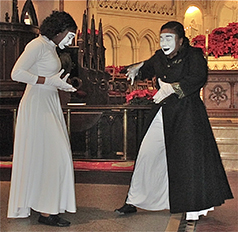

Two mimes from Stir Up the Gift Arts Academy perform a Ministry of Dance to music, “It’s Going to Get Better!” The mimes are Academy Foundation founder Keisha Tigner and her student, Janaya Pitt. Photo: Dortha Cool Willetts.
Community Celebrates 87th Birthday of Martin Luther King Jr.
MIDDLETOWN - A small crowd of people marched in the cold and a bitter wind from the corner of Martin Luther King, Jr. Way and Main Street north up Main Street to The Church of the Holy Trinity, in observance of King’s 87th birthday. The marchers were led by state Rep. Matt Lesser, Mayor Dan Drew, Board of Education member Anita Dempsey-White, President of the MLK Jr. Scholarship Committee Yalonda D. Hart and other members of the Middletown community.The invocation was given by The Reverend Dana Campbell of the Church of the Holy Trinity. She also read the six Principles of â€Ĺ"Kingian” Nonviolence taught by that group in Connecticut schools as a way of introducing new generations of young people to Dr. King and the relevance of his teachings for our lives today:
1. Nonviolence is a way of life for courageous people.
2. The beloved community is the framework for the future.
3. Attack forces of evil, not persons doing evil.
4. Accept suffering without retaliation for the sake of the cause to achieve the goal.
5. Avoid internal violence of the spirit, as well as external physical violence.
6. The universe is on the side of justice.
â€Ĺ"I find it highly appropriate that the Scholarship Committee holds its annual event in celebration of Dr. Martin Luther King, Jr. because it is so important that all of our children come to know what greatness really means through Dr. King’s example of service,” added Rev. Campbell
Master of Ceremonies for the day, Anita Dempsey-White, welcomed Drew, state Sen. Dante Bartolomeo, Lesser and Common Council members Grady Faulkner, Sebastian Giuliano and Carl Chisem to the event.
Drew spoke about the current presidential campaign and the â€Ĺ"demagoguery” heard in many speeches of some candidates.
â€Ĺ"You may be tempted to feel that we are sliding backwards. However, there will always be intolerant, ignorant people,” said Drew. â€Ĺ"What you are seeing is that our society has made so many advances, the people who can’t comprehend the progress in our societal structure don’t know how to respond except to lash out...But the truth is that the more our society progresses, the more people understand that love and compassion are what drive us.
â€Ĺ"Dr. King said once that ‘The arc of the moral universe is long, but that it bends toward justice.’ I have no doubt that if we follow his teachings, then our best days are still ahead of us,” said Drew.
The program began with 2010 MLK Jr. Scholarship Recipient Jenee Midgette giving a brief but moving history of King’s life and the civil rights movement. Then students of the Oddfellows Playhouse read selections about Martin Luther King, Jr. Dempsey-White introduced the keynote speaker, The Honorable Raheem L. Mullins, a judge of the Connecticut Appellate Court.
Mullins spoke of what the word â€Ĺ"greatness” means to people, giving a dictionary definition of the word, â€Ĺ"a person who has achieved importance or distinction in a field,” Mullins said. â€Ĺ"It also means ‘noble, remarkable, exceptionally outstanding.’”
Mullins said we know great people all the time who are not famous but are remarkable, noble or exceptionally outstanding, but Dr. King had all of these qualities, not just because he was famous, but because of his achievements.
â€Ĺ"He championed the principle of equality of all people based the content of their character and his dedication to that principle made him great. His ability to transform hatred into love made him noble, remarkable and exceptionally outstanding. His service to others also made him great,” said Mullins.
â€Ĺ"How does one achieve greatness?” he continued. â€Ĺ"What does it take to have significant impact on the lives of others? The emotion that is most important for people to learn to manage is their anger. Greatness requires that we experience some anger. We can achieve greatness by learning to manage our own anger effectively. Dr. King is an example for us. Dr. King knew that anger is one of the most powerful emotions that shape our behavior. He appreciated the dynamic power of anger and knew how to use it very effectively.”
Mullins cited two concrete examples in King’s life of how he experienced anger and how he reacted to it. The first was when someone bombed his house while he was sitting in the living room with his wife and small baby. The second was when he was on a stage, about to give a speech and a member of the Nazi party jumped on stage and punched him in the face several times. These are only two of the times people treated him violently.
Mullins described how King said he could feel his anger rising when he realized that his wife and baby could have been killed. He did not allow himself to become vindictive. He soothed the supportive but angry crowd outside and told them â€Ĺ"We must love our enemies.”
When a security guard rushed to help him on the stage, King said he would not press charges. Controlling his anger, asserted Mullins, is how King became remarkable, noble and exceptionally outstanding and great.
â€Ĺ"You can do this, too,” asserted Mullins. â€Ĺ"If there is something wrong with society, your family or your job, wake up and pay attention. Without anger, we would not have the awareness of the things that are wrong with our society and get the motivation to act or change things. Great people don’t ignore their anger; they just don’t allow their anger to consume them, but they use it in a positive way,” he said.
â€Ĺ"Channel your anger, disappointment and frustration into a higher purpose. Don’t dwell on the past; that will not solve the problem. Look beyond the problem; think about the incidents and attitudes that led to that problem.”
Mullins ended with a quote from Mahatma Gandhi: â€Ĺ"‘I have learned through bitter experience the one supreme lesson to conserve my anger, and as heat conserved is transmitted into energy, even so our anger controlled can be transmitted into a power that can move the world.’”
A poem about King was read by James B. Hill, a student at Thomas Edison Middle School in Meriden. Then an emotionally stirring, uplifting and artistically excellent mime ministry of dance was performed by two students of Stir Up The Gift Arts Academy of Middletown, Waterbury and Hamden. The dance expressed the lack of hope and the frustration of people in the civil rights movement, the power of anger and public protest, then renewed hope, and the belief that â€Ĺ"It’s going to get better!” for racial equality and justice.
The program ended with Middletown High School student Nia West leading the audience in singing â€Ĺ"Lift Every Voice and Sing,” closing remarks by Yalonda Hart, and the benediction by Rev. Campbell. A light lunch was served afterwards.








